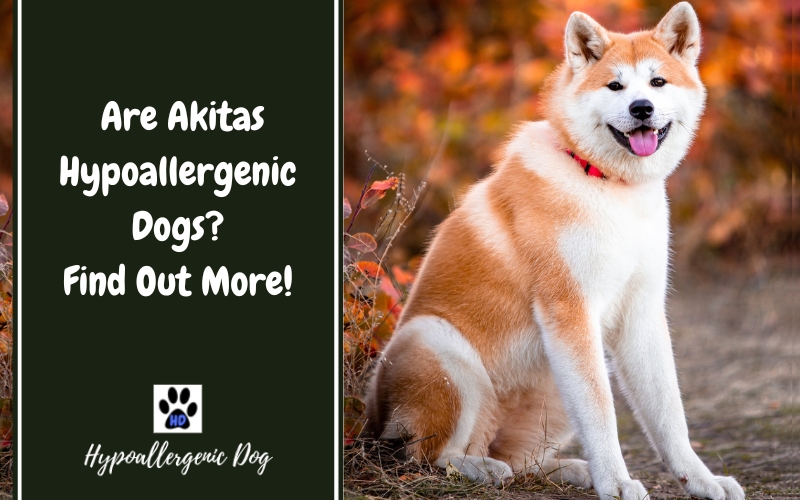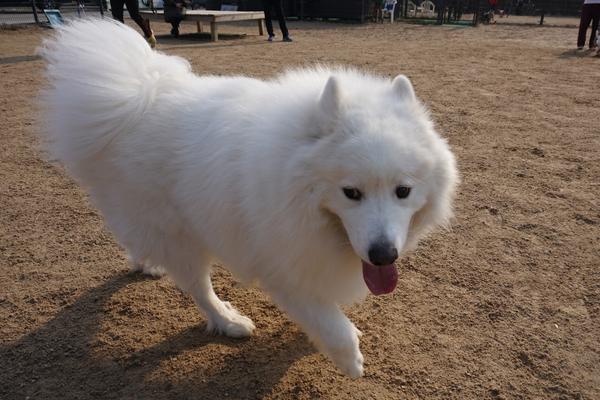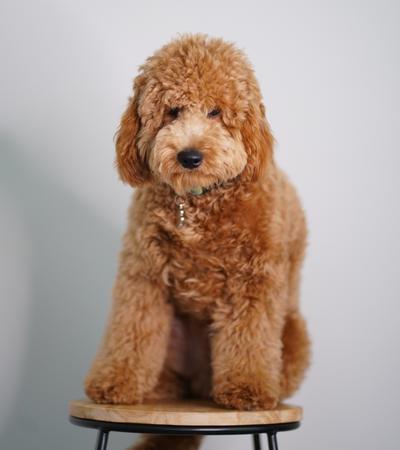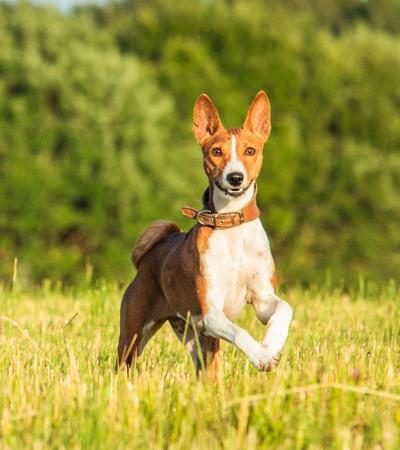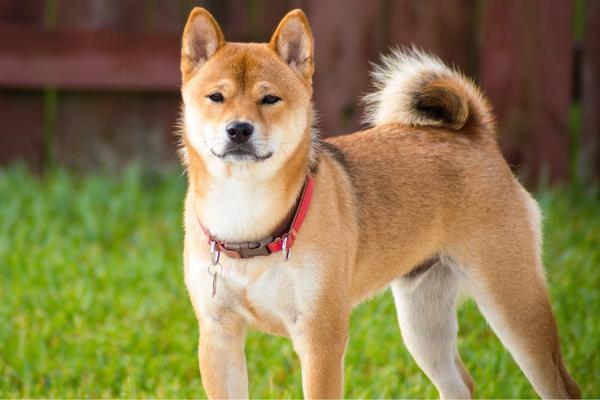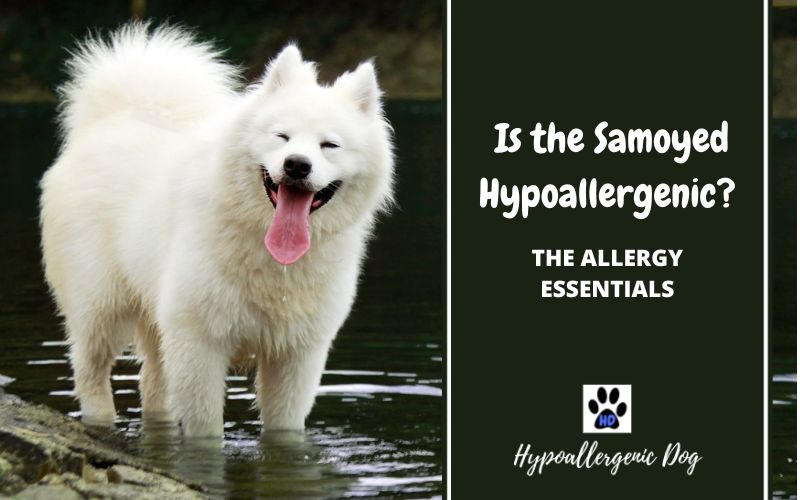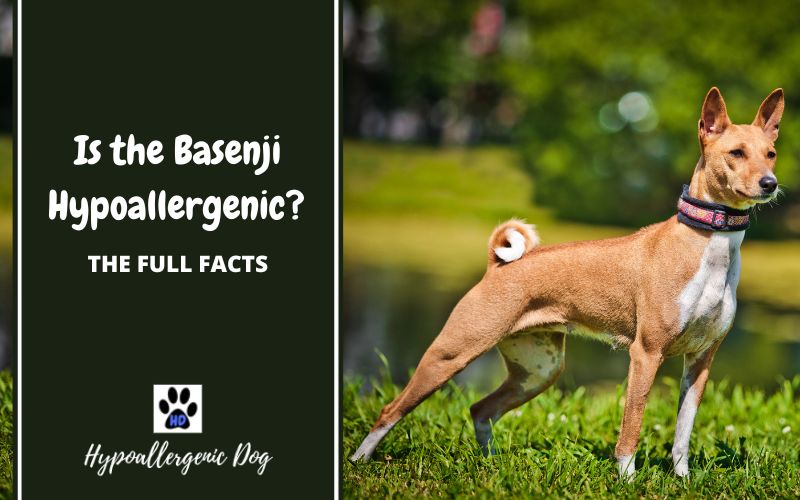Are Akitas Hypoallergenic?
Are Akitas hypoallergenic dogs? If you have dog allergies, you’ll be disappointed to learn that Akitas aren’t hypoallergenic. These Asian, Spitz-like dogs blow their coats twice a year and shed too much to be classed allergy-friendly.
Akita Quick Facts
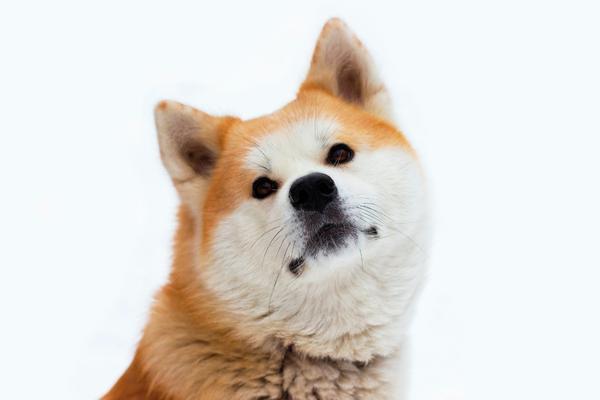
Finding out you have a dog allergy can be devastating if you want a furry friend in your life. However, allergies don’t have to mean a canine companion is completely out of the question.
Several dog breeds are deemed hypoallergenic, or more ‘allergy-friendly,’ than others. Despite the common assumption, dog allergies are caused by proteins found in a dog’s saliva, urine, and dander. It’s rarely the dog fur or hair that is the problem, it’s the allergens attached to it.
Many low-shedding breeds are ideal for people with allergies — releasing fewer allergens than other dogs.
You can live in harmony with your pooch, even if you have allergies! However, choose a breed that doesn’t blow their coat, drool much, or shed heavily all year round.
Check out our article, What Is a Hypoallergenic Dog? for more information.
Of Japanese origin, these Spitz-type dogs have a medium-length double coat. The Akita is fluffy and cute but has the look of the wild about them too. Akitas have a wolfish face but often have a red, fox-like coat.
The Akita’s coat is made up of a dense and soft undercoat, with a top layer of coarse, medium-length guard hair. While this looks adorable, it also works well to keep your Akita warm in colder climates.
Colorwise, coats can be red, brindle, white, or a combination. Whatever your Akita is, you won’t be able to resist snuggling into its soft and fluffy fur.
This breed sheds mildly throughout the year, but Akitas also blow their entire undercoat in the spring and fall.
Dogs with double coats shed excessively at the change of the seasons, and the Akita is no different. During this time, your Akita will lose huge clumps of fur, and you will find dog hair all over your home for weeks on end. However, this heavy shedding is important to help your Akita remain at a comfortable temperature in the winter and the summer.
The heavy seasonal shedding can last from 2 weeks up to 2 months. For the rest of the time, Akitas shed moderately, yet, this intense seasonal shedding means they aren’t a suitable breed for allergy sufferers.
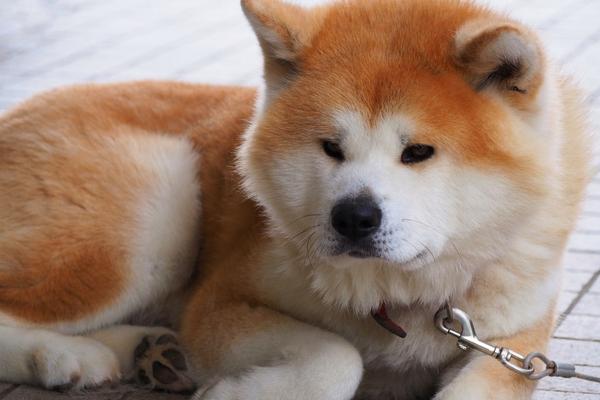
There is no way to stop your Akita — or any dog — from shedding completely. This is an important part of a dog’s hair growth cycle, and if you have a heavy-shedding dog, it’s all part and parcel.
That said, you can effectively manage it and even reduce the amount of hair your pooch loses.
Here are some tips on how to stop an Akita from shedding:
1. Brush Your Akita Outside
When it comes to grooming, Akitas only need to be brushed once a week. However, during the shedding seasons, you’ll need to brush your pooch every day.
When your Akita is shedding heavily, brush them outside to remove the dead hair from their coat. Outdoor brushing will drastically reduce the amount of fur settling on your soft furnishings and carpet.
2. Use Deshedding Tools
Deshedding brushes and combs are the perfect grooming tools for heavy-shedding dogs. A deshedding rake can also help to speed up and manage the natural shedding cycle.
These grooming tools are specifically designed to remove large amounts of fur from your dog’s undercoat swiftly in one go. However, go steady, when they’re misused they can scratch and irritate your dog’s skin.
3. Keep Baths to a Minimum
Akitas aren’t smelly dogs and don’t need regular bathing — around four or five times a year should be adequate.
If you choose to wash your dog more frequently, you may be causing more harm than good. It could lead to skin irritation or moisture loss. Dry skin can exacerbate shedding, so it’s essential to use products that moisturize and nourish your Akita’s skin, as well as their coat.
4. Healthy Diet
Reducing how much your Akita sheds all starts with a healthy diet. If your dog isn’t receiving the appropriate nutrition, their skin can become dry. As mentioned, this can make shedding even worse.
Omega 3 and 6 fatty acids are important for maintaining healthy skin and fur. Pet owners should choose foods that include these nutrients or provide a canine-specific supplement instead.
Avoid overly processed kibble that’s high in fillers — as in, ingredients used for bulking it out, with minimal nutritional value. These foods lack the correct balance for your pooch. If your dog has food allergies, this can cause skin irritation and lead to excessive loss of fur.
So, go for foods that indicate they include a complete and balanced ingredients profile.
5. Vacuum Regularly
There is no denying it, during shedding seasons there will be a lot of fur in your home. The best investment you can make as an Akita owner will be a powerful vacuum cleaner.
Many modern vacuums are specifically designed to remove pet hair and come with added attachments, making it easy to clean fur from your furniture. For more info, check out our guide on the Best Vacuum Cleaner for Pet Hair.
The appearance of the Akita is similar to many other Spitz dogs. Unfortunately, these breeds are all heavy shedders and could in no way be hypoallergenic.
But it’s not all bad news, many breeds are more allergy-friendly than the Akita, but also share either similar personality traits or physical attributes.
The Samoyed is similar to the Akita as they share a similar ‘wild animal’ appearance. The wolf-like Samoyed has a fluffy white coat and also sheds heavily twice a year. However, unlike many other double-coated breeds, Samoyeds don’t release a lot of dander when they shed — thus less likely to trigger allergies.
The breed has a gentle nature and gets on well with other animals and humans of all ages. If you enjoy long walks, the Samoyed may be the perfect canine companion for you. The Akita is wearier of strangers than the Samoyed, but they both share a strong and unwavering loyalty for their owners.
Although the Goldendoodle looks nothing like the Akita, they do share some key traits. In fact, some of those are even better in the Goldendoodle.
Both these breeds are part of the working breed group, which means they’re dogs that love to have a job — even in a family environment. This breed is highly intelligent due to their Poodle genetics, so training should be a breeze.
The Akita is a large dog that can weigh over 100 pounds. However, depending on what size poodle your Golden is bred with, they could reach weights of between 45 to 100 pounds.
Both the Akita and Goldendoodle are intelligent, friendly, and energetic, making them ideal family dogs.
Basenjis are smaller than Akitas, weighing just 24 pounds and growing to around 17 inches. Despite this, they share some physical features of the attractive Akita.
The Basenji has a turned-up tail like the Akita and is commonly found with a fox-red and white coat. This breed is often referred to as ‘cat-like,’ in that they self-groom and have a feline agility in the way they move.
While there will be no escaping the Akita’s shedding fur, a Basenji hardly sheds at all. Their short and fine coat will just mildly shed throughout the year and requires very little grooming and maintenance.
Akipoo
The Akipoo is one of the only Akita mixes that’s more allergy-friendly than the pure Akita. The Akipoo is a hybrid breed, crossed with a Standard Poodle.
Akipoos are affectionate, loyal, and loving toward their owners. They also get on well with children, but can develop the stand-off attitude of the Akita. This is a highly-intelligent breed, so they shouldn’t be too difficult to train. However, they’re a super active canine that loves to play, meaning this pooch needs plenty of exercise.
Bear in mind, as a hybrid breed, the Akipoo could inherit the coat of either parent. If you’re lucky, your Akipoo will be more Poodle than Akita and won’t shed heavily enough to cause an allergic reaction. But, it’s a gamble.
Conclusion
The Akita is a loyal and courageous Spitz-like dog with a dense, fluffy double coat. However, if you have allergies, you may have to rethink your choice of canine companion.
Are Akitas hypoallergenic dogs? No. But there are similar breeds that don’t shed as much. Hence, if you have allergies but love the Akita, the Basenji, Samoyed, or Akipoo will be a more allergy-friendly alternative.
Are Akitas Heavy Shedders?
Yes, Akitas are heavy-shedding dogs. You can expect the Akita to blow their coat at least twice a year, losing large clumps of fur as they grow their new coat for the coming season. When they aren’t blowing their coats, Akitas are mild shedders for the rest of the year.
Are Akitas Good Pets?
Akitas are known to make loyal, loving, and protective pets. While they can get on well with children, they’re known to be cautious of strangers and can be aloof and weary around people they don’t know.
Are Akitas Difficult to Train?
Akitas are intelligent and can be easy to train. However, an Akita can be strong-willed and swiftly lose interest. Hence, you’ll need to keep training exciting and engaging. Akitas respond well to positive reinforcement and will need to be socialized and trained from an early age.
Will an Akita Protect Its Owners?
Yes, Akitas were bred to protect royalty in Japan. Akitas are devoted guard dogs and love to be the main protectors of the family. If you want a loyal guardian, the Akita will happily fill the role.
What Is the Personality of an Akita?
Akitas are affectionate, silly, and loving but only with their family. As protective watchdogs, Akitas can be aloof and cautious around strangers. This breed can also be strong-willed and may appear quite standoffish. However, as a pet, Akitas are full of energy and love for their owners.
Do Akitas Cause Allergies?
The Akita isn’t a hypoallergenic dog, so won’t be a good option for those suffering from dog allergies.
What Is the #1 Hypoallergenic Dog?
The number one hypoallergenic dog is the Bichon Frise. They’re small and compact, making them a great choice for almost any household.
Is Any Dog 100% Hypoallergenic?
There are no dog breeds that are considered 100% hypoallergenic. But some are less likely to cause allergy symptoms, such as:
Do Akitas Shed a Lot?
Akitas are considered to be average shedders, but they have a double coat. This means they will blow their coats twice a year — in the spring and fall. This is when they will shed a lot.

